You may wonder which is the best option for your situation, a heat pump or an air conditioner?
We describe the similarities and the differences between the two and when best to use each one.
For now, let’s have a look at the pros and cons of each.
Heat Pump vs Air Conditioner

Heat Pump
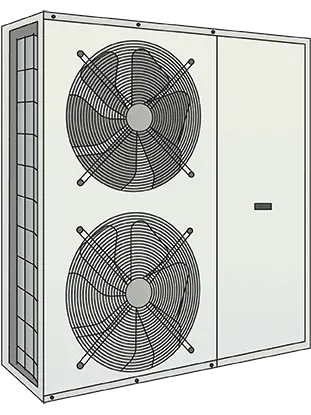
Air Conditioner
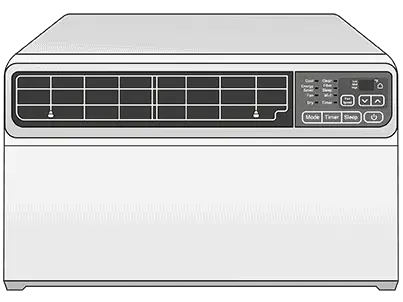
Pros
Heat Pump
Quiet operation
High efficiency in heating mode
Can provide heating and cooling
Safer than combustion-based heating methods
Air Conditioner
More compact
Lower initial cost
Easy to pair with a furnace or other heating source
Cons
Heat Pump
High initial cost
Higher maintenance cost
Low efficiency in extreme cold
Air Conditioner
Only cools
Needs a paired heating source
Best For
Heat Pump
Heat pumps are best for milder climates where you can take full advantage of both the heating and cooling modes. The heat pump doesn’t perform well in extreme cold.
Air Conditioner
A traditional AC system is best for hot climates with little or no need for heating. If the home already has a heating system installed, an AC may be a better option.
What is a Heat Pump and How Does It Work?
The term heat pump is misleading. A heat pump is neither a pump nor a single component. A heat pump is a system that works similarly to an air conditioner (AC), with one vital difference; an AC system only cools, whereas the heat pump has both heating and cooling modes. The pump part of the system is a compressor similar to an AC compressor but with a reversible function.
The basic system comprises two coils and two fans, one each inside and outside- the compressor, refrigerant, expansion valve, and reversing valve make up the rest of the components.
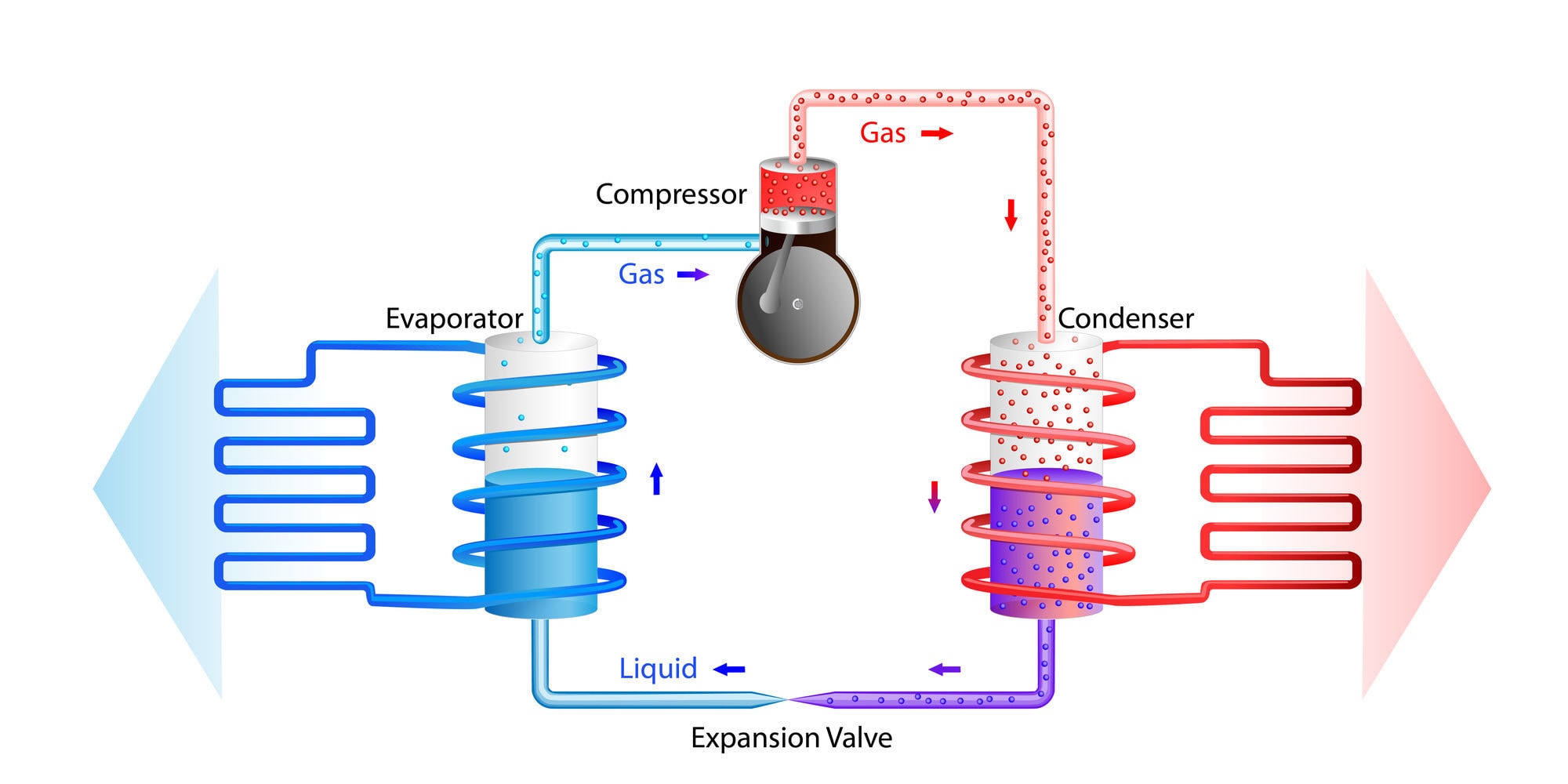
Each coil can act as either condenser or evaporator, depending on whether the system is in heating or cooling mode. The refrigerant is the medium used to transfer heat, and the compressor moves the refrigerant around the unit. The reversing valve changes the refrigerant’s flow direction, and the expansion valve acts both as a metering device and a pressure regulating device.
In cooling mode, the heat pump works the same as a standard AC. The outside coil acts as the condenser and the inside coil as the evaporator. In heating mode, the flow of refrigerant reverses, swapping the coils’ functions.
Types of Heat Pumps
Now that we’ve discussed the essential operation of heat pumps, we can cover a few of the most common types below:
Air-Source
As the name suggests, air-source heat pumps use the air blowing over the inside and outside coils to transfer heat to and from the refrigerant.
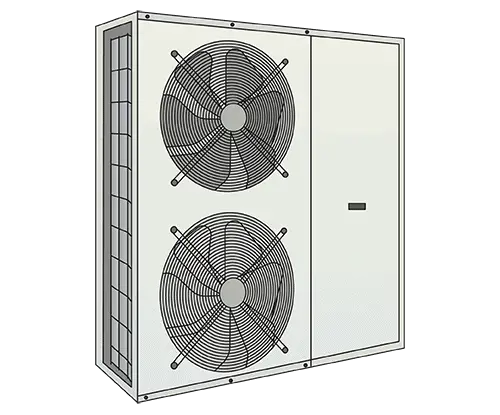
Geothermal
A geothermal or ground source heat pump uses either earth or water to transfer heat. Geothermal pumps work either on closed or open-loop systems to transfer heat to or from the ground source.
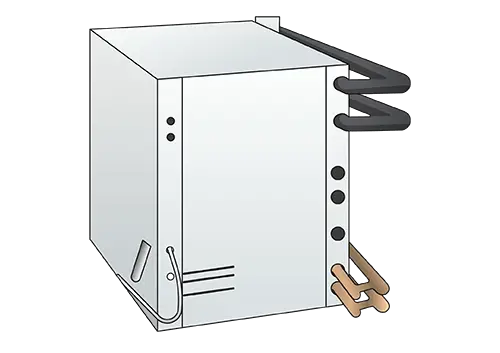
Absorption
An absorption heat pump uses ammonia instead of refrigerant and can use gas, solar power, or even geothermal heated water for energy. These types of heat pumps are for larger applications.
Like AC units, we can also categorize the heat pump systems according to the configuration:
Ductless
This configuration has an external module with a coil and fan. The ATUs are located in the area to be heated or cooled, eliminating air ducting.
Mini-Split
The mini-split unit also has outside and inside units. The inside ATU is a single unit, with warm or cold air piped to the areas that need treatment through ducting.
Packaged
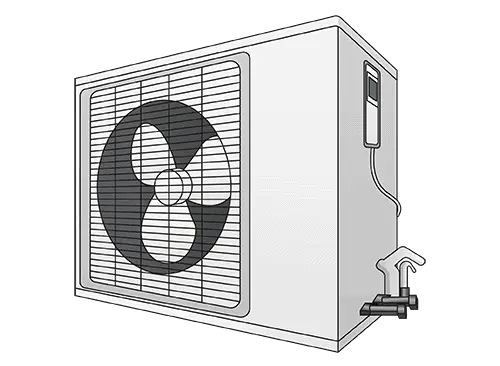
A single casing houses all the components, which can be slab or roof-mounted. Ducting carries the treated air.
What is an Air Conditioner and How Does it Work?
The purpose of an air conditioner is to treat and cool air. Air conditioners work on the principle of energy transference. The energy is transferred from the room to be cooled and then dumped somewhere else. There are several components necessary to effect this transference:
Refrigerant and Compressor
The refrigerant is the medium used to transport the energy through the system. The compressor pressurizes the refrigerant and moves it through the system.
Condenser and Fan
The compressor compresses the hot refrigerant in its gaseous form, forcing it to the condenser. The fan blowing over the condenser removes enough heat from the refrigerant to condense into a liquid.
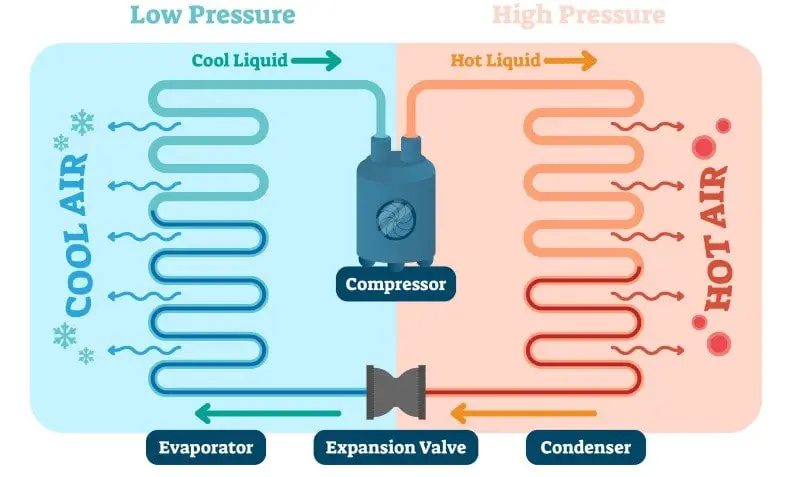
Expansion Valve
The expansion valve acts as both a metering and expansion device and controls the refrigerant’s flow and pressure by expanding the pipe and dropping the pressure at the evaporator.
Evaporator and Fan
In the evaporator, the refrigerant begins to boil, absorbing heat energy from the environment without increasing in temperature as it changes state from liquid to gas. The evaporator fan blows the cooled air through ducting into the areas to be cooled. The gaseous refrigerant now returns to the compressor, starting the cycle over again.
Filters
There is a fine filter at the evaporator fan to remove dirt and allergens from the air and a coarse filter at the condenser fan to help keep the condenser coils clean.
If you want to know more about how an air conditioner works, check out our How Does an Air Conditioner Work? article.
Types of Air Conditioners
We can break air conditioners up into categories according to their configuration and mounts. Here is a short overview of some of the most commonly found AC types.
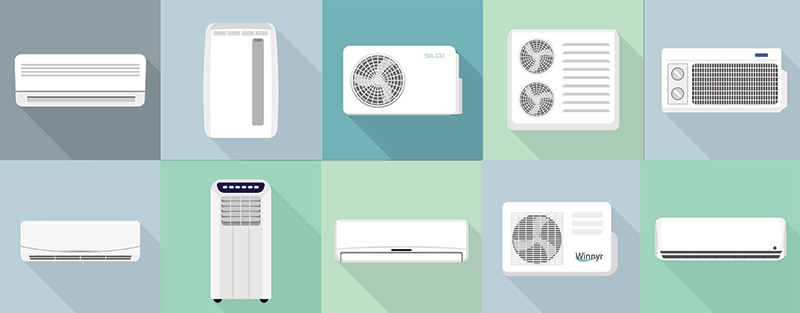
Conventional Air Conditioners
Conventional ACs are the most basic type. They can come in any configuration, but the compressor is either on or off, with no speed control to help regulate the refrigerant’s flow and pressure.
Window Units
A window unit is a small AC designed to fit in a window opening and cool only one room. One cabinet houses all the components, and cold air is blown directly into the room from outside.
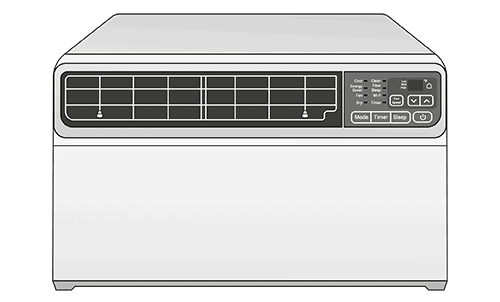
Ductless Mini Split AC
Ductless mini-split ACs have outdoor and indoor units. The outdoor unit houses the compressor and condenser coils, and fan. The ATUs are in the rooms to be cooled and accommodate a fan and evaporator, eliminating the need to install air ducting. A ductless mini-split AC can cool one room or many, but the condenser and evaporators need to be compatible.
Packaged AC
The packaged AC houses all the components in an outdoor cabinet with ducting running into the building, eliminating the need for ATUs inside the building. The AC can be roof-mounted or slab mounted.
Relevant Characteristics Between Heat Pumps and Air Conditioners
Heat Pump vs Air Conditioner
Compare by tapping or clicking below!

Voltage
Heat Pump
120V-480V
Air Conditioner
120V-480V
Size
Heat Pump
4 000 BTU+
Air Conditioner
9 000 BTU+
SEER Range
Heat Pump
13-33.1
Air Conditioner
13-26.5
EER
Heat Pump
11.7-18
Air Conditioner
11.7-16.5
Similarities and Differences
The two systems work on similar principles, but there are also some differences, so they fall into different HVAC categories. Understanding the differences and similarities between the two systems is vital in deciding which option best suits you. Let’s discuss these differences and similarities.
Heat Pump and Air Conditioner Differences
Reversible Cycle
When looking at the two systems, the most noticeable difference is that the heat pump can either warm or cool your home, whereas the AC only has a cooling function. Often AC units have heating coils added, but this is an extra feature and not part of their operation.
There are advantages to having a single HVAC system that both heats and cools your home, but there are also disadvantages. Most heat pumps lose efficiency when the outside temperature drops below freezing, which means that the heating cycle loses some of its appeal in colder climates.

Longevity
A heat pump system heats and cools so it runs year-round, resulting in a reduced lifespan compared to an AC. However, in the right climate and with diligent maintenance, a good heat pump can last up to 30 years.
Maintenance intervals on a heat pump system are shorter than an AC system because it runs throughout the year. Consequently, cleaning filters and coils should be undertaken more frequently on a heat pump system than on an AC system.
Economy
There isn’t a significant difference between AC and heat pump systems in cooling mode; the real savings come in the heating mode. Heat pumps use latent heat from the environment to heat your home, reducing or eliminating the need for traditional heating systems.
To put these savings into context, a gallon of heating oil contains 138,500 BTU, so to achieve heating of 60,000 BTU, you are using half a gallon per hour (not taking into account the furnace’s efficiency). The system’s efficiency translates into savings on your heating bills.
Heat Pump and Air Conditioner Similarities
Operating Principles
Both heat pumps and ACs work on the same principle- heat transfer. Both systems have the same components, and both use refrigerants to effect this transfer. Both heat pumps and ACs use a compressor, two heat transfer coils, and an expansion device, with a reversing valve for heat pump systems.
The components are so similar that it takes a very close look to determine whether you have a heat pump or an AC installed.

Configuration Choices
Because both heat pumps and ACs have similar components, the configurations are alike as well. Similar arrangements mean that the space used for the units is also the same. With both AC and heat pump systems, you can opt for a split, ductless split, or packaged units, depending on what best suits your application.
You can easily replace an existing AC system with a heat pump with the same configuration without making significant changes.
Cooling Mode
When in cooling mode, heat pumps and ACs have the same characteristics and almost identical efficiency for similarly configured systems. A different way of looking at it is that a heat pump is an AC with the ability to heat and cool your home without the addition of electric or gas heaters.
Installation Cost
The addition of a reversing valve on the system makes a heat pump’s initial cost slightly higher than the traditional AC’s. Installation costs, though, are not affected when using the same type of configuration for air-source heat pumps.
Geothermal (water or ground source) heat pumps cost more to install but are more energy efficient. The installation’s indoor and outdoor space also remains the same when comparing the same configurations.
What About Combo Units?
Although combo units may be an option to look at, there are drawbacks to them as well. A combo unit is mating an AC for the summer months with a furnace or heating system for winter, using the same air ducting and air filtration units.
Understanding the benefits and potential drawbacks of installing a combo unit helps the decision-making process.
Different Lifespans
A furnace will last up to one and a half times longer than an AC system, which means that your AC’s primary service or replacement date comes up well before the furnace. The homeowner now has the choice of being restricted to an AC that is compatible with the existing furnace or replacing the entire combination, sacrificing the extra lifespan of the furnace part of the combo.
High Initial Cost
The initial cost of installing a combo system is higher. The long-term savings may make this a viable option for colder climates. Heat pumps lose their efficiency at outside temperatures below freezing point, meaning that a dual-fuel hybrid combo can be an attractive option.
However, a heat pump works more efficiently and cheaper in milder climates than a furnace or boiler, so having the choice adds no value.
Fuel
Some homes may not have access to gas lines, or a tank for heating oil, making the furnace option less attractive. In milder climates, the ability to switch between an electrical heat pump system and a furnace has little or no benefit, as the heat pump runs more efficiently than a furnace.
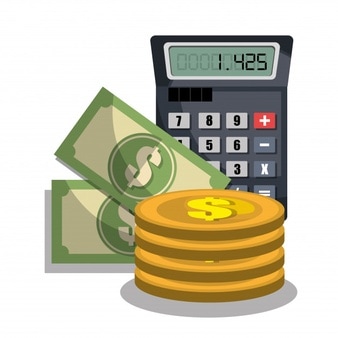
Possibility of Voiding Warranties
Suppose components of the combo system you choose are not fully compatible or not approved by the manufacturers. In that case, you risk voiding warranties, which is a particular problem when replacing only part of a combo unit, such as the AC, and not the entire combination.
So, How Do I Choose the Best System for My Home?
When choosing the best system for your home, it’s always best to consider all the variables, as a system that is suitable for one area may not be ideal for another.
Climate
Climate determines your priorities in what you are looking for in an HVAC system. If you have hot, humid weather year-round, you are looking for a straight AC system and don’t even need to consider heating options. In a milder climate with moderately cold winters, a heat pump system is a better fit or a combo unit for hot summers and cold winters.

Budget
When choosing a new or replacement system, budget is a significant consideration. It is best to look at both the initial cost of the system and the installation cost. A system that may suit all your needs in other respects could prove too costly to install if there are significant changes to be made to accommodate it.
Energy Efficiency
There are two reasons to take energy efficiency into account. The first is that the higher your unit’s energy efficiency, the lower your utility bills are. The second is that some states give a tax rebate for installing energy-efficient systems in addition to the federal tax credits.
When and Why Would I Use a Heat Pump?
Each household and area has different needs, so to help you decide if a heat pump is the best option, we have looked at a few factors that make this an attractive option under the right circumstances.
Mild Climate
The chief benefit of a heat pump is that it can both heat and cool your home efficiently. In milder climates with hot summers and moderately cold winters, the heat pump is a natural choice as it works as an AC in summer and a furnace in winter.
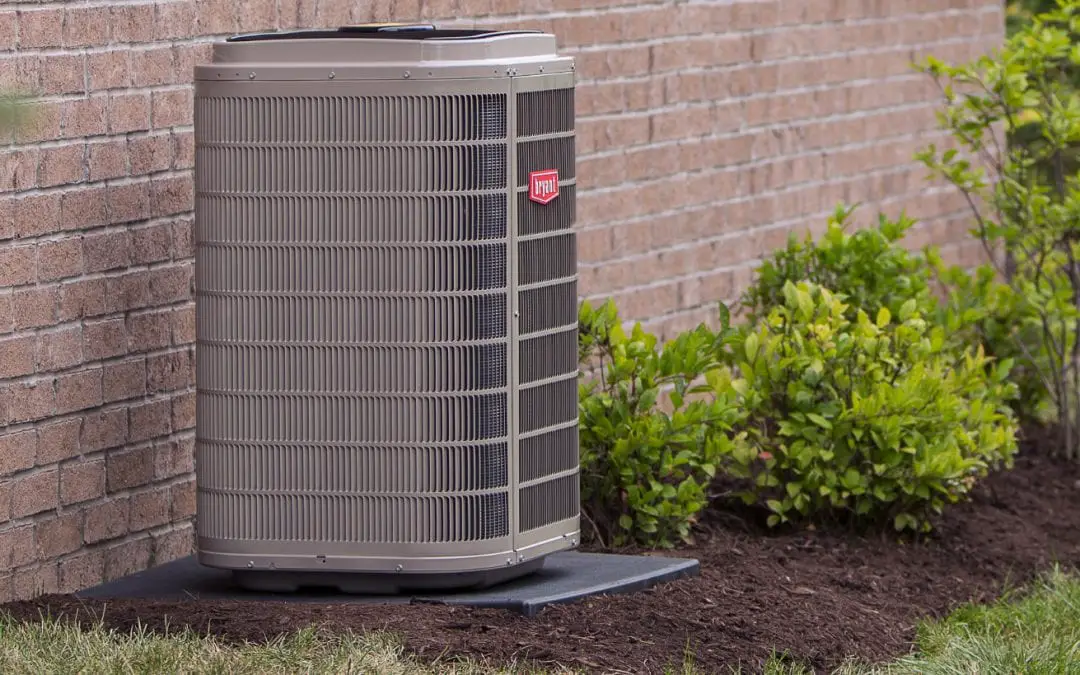
Smaller Homes With Limited Space
In a home with limited space to install bulky equipment, the purchase of a heat pump is viable. The heat pump system takes up a similarly rated AC space but carries out both heating and cooling functions.
Restricted Access to Heating Fuels
Suppose you live in an area with restricted access to gas or heating oil for winter. In that case, a heat pump is an appealing solution, rather than relying on expensive and inefficient electric heaters to warm your home. Although the heat pump also runs on electricity, it uses a third of the electricity that a resistance heater would.
When and Why Would I Use an Air Conditioner?
Sometimes a traditional AC is a better option than a heat pump, and to help you decide if this is a better option for your circumstances, we have listed a few instances where this is the case.
Hot Climate
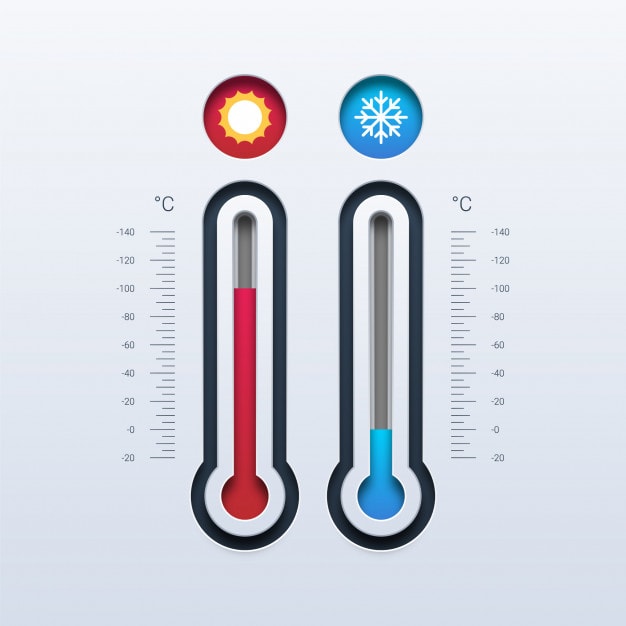
In areas with a hot summer and mild or warm winter, an AC is the best choice. There is no need to spend extra on a system that can heat and cool if you’re going to use the heating mode only occasionally, or not at all.
Hot Summers With Cold Winters
A heat pump loses efficiency at temperatures below the freezing point. If you live in an area with hot enough summers to warrant AC, but the temperature frequently drops below freezing, pairing an AC with a furnace is a better option, as this heating system gives better heat under these conditions.
You Already Have a Furnace Installed
If you already have a furnace installed, the extra cost of a heat pump installation may not be worthwhile. It’s always easier and cheaper to replace an existing system with a similar one to save on the cost of retrofitting a different type of system.
Maintenance and Repairs for a Heat Pump vs Air Conditioner
Another consideration is the annual maintenance and repair cost comparison between heat pumps and AC systems.
The recommendation is to carry out a tune-up twice per year on the heat pump system, which consists of changing filters and cleaning the coils and a general check-up. This costs between $150 and $300. The cost of service and tune-up on an AC system costs around the same, but the interval is only once annually.
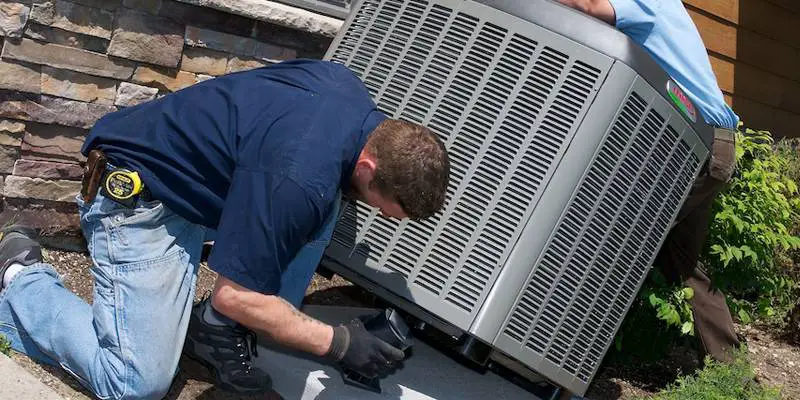
The national average repair cost for a heat pump system is $371 with a typical range of $156 to $590, but repairs could cost as little as $65 or as much as $1800. The national averages for repairs to an AC system are in a similar range.
Additionally, during the winter, it’s crucial to ensure that the outside coils on the heat pump system stay clean and clear of winter debris and ice. Blocked airflow or iced-up coils severely impact the system’s efficiency and result in improper heating.
Although the annual maintenance cost of a heat pump system is higher, you should balance this against what would have been the cost of maintaining a furnace. As far as repairs go, the AC and heat pump systems are almost identical in price.
Bottom Line
There are several similarities between heat pumps and ACs, but there are some significant differences too. If you are trying to decide which one is best for you, the answer lies in the individual circumstances in your environment, such as climate, already existing installations, and usage.
There are both benefits and drawbacks to using or installing either system, and the weight of these benefits or disadvantages depends on the different circumstances surrounding each installation.
A heat pump is an excellent option for climates where you’ll be making use of both heating and cooling modes, but an AC is a better bet for extreme environments.
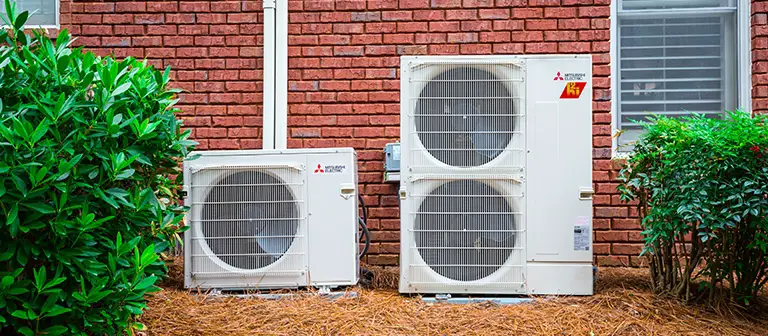
People Also Ask
Most people looking for the best HVAC system to install only know that they want their home heated, cooled, or both. They aren’t experts on the subject, so there are always additional questions or queries, and we have tried to answer the most commonly asked ones in the section below.
In the cooling mode, there is not a big difference between an AC and a heat pump. There are considerable savings in winter when the heat pump runs in heating mode. However, if the outdoor temperatures are below freezing, the heat pump loses some of its efficiency.
Heat pumps use the same amount of electricity as a traditional AC system and about a third of what a resistance heater would use. You would use less electricity in the winter with a heat pump than you would with electrical heating systems.
In milder climates where the temperature rarely drops below freezing, a heat pump system is enough to heat your home adequately. We recommend an alternative heating source for harsher winters as the heat pump loses efficiency when the temperature drops below the freezing point.
Heat pumps last between 10 and 20 years. The average lifespan of a heat pump is 15 years.
Poor maintenance practice or environmental factors also influence the lifespan of a heat pump.
An air conditioner can last between 15 and 20 years. As with heat pumps, maintenance and environmental factors affect the longevity of the systems. An AC lasts longer than a heat pump because it’s used less.
